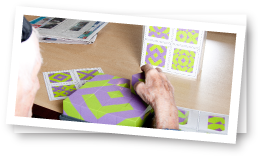Our Blog

November 11, 2013
Diagnosing Dementia early
Diagnosing Dementia early
Dementia is one of the most feared health conditions. People with dementia and their families are sometimes reluctant to seek advice when concerned about memory or other problems. But there are many potential benefits to getting medical advice if you’re worried. Being diagnosed early is important for many reasons. It helps you to get the right treatments and to find the best sources of support, as well as to make decisions about the future.
It may not be clear why someone has problems with memory or has a change in behavior. These problems may be because of dementia, or down to other reasons such as poor sleep, low mood, medications or other medical conditions. This uncertainty can be distressing for both the person experiencing difficulties, and their family and friends. While a diagnosis of dementia can be devastating news, an explanation of what the problem is and what can be done about it can help people feel empowered and reduce some of the worry caused by uncertainty. Some people find it helpful to discuss with doctors and nurses how the dementia may affect them or their loved one in the future, and there is advice available about how to stay independent and live well with dementia.
Dementia is not a single condition – it refers to difficulties with thinking and memory that may be caused by several different underlying diseases. This is one reason why not everyone with dementia experiences the same problems.
Identifying that there is a problem, and then diagnosing the underlying cause is important for guiding treatment and accessing services.
Some causes of dementia are treatable and reversible (either partially or fully, depending on the nature of the problem). Conditions such as anxiety and depression, some vitamin deficiencies, side effects of medications and certain brain tumors fall into this category.
Treating high blood pressure, high cholesterol and poorly controlled diabetes is also important, as is stopping smoking and keeping to a healthy weight. These factors (known as risk factors) all contribute strongly to vascular dementia, and may make Alzheimer’s disease worse. Your GP will be able to assess your risk factors, advise if treatment is needed and monitor you.
Other support
Whether or not there are specific treatments for the cause of the dementia affecting you, having the correct diagnosis is important for getting the right advice and support. There is a lot of help and information available both for people with dementia and their friends, relatives and carers.
- Information on help available at home or in the community, such as from social services, day centers and respite care, community mental health teams, speech and language therapists, dietitians and occupational therapists.
- Advice regarding financial affairs and planning for the future.
- Financial benefits and support
- Advice about driving .
- Advance care planning and help with setting up a Lasting Power of Attorney if the dementia is progressive. This enables a person to be involved in discussions about their future when they are still able to do so effectively.
- Information and support groups.






